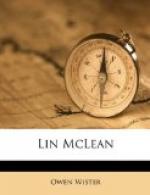“Do you like flapjacks and maple syrup?” inquired the artful McLean. “That’s what I’m figuring on inside twenty minutes.”
“Twenty minutes! If they’d wait—”
“See here, Bill. They’ve quit expecting yu’, don’t yu’ think? I’d ought to waked, yu’ see, but I slep’ and slep’, and kep’ yu’ from meetin’ your engagements, yu’ see—for you couldn’t go, of course. A man couldn’t treat a man that way now, could he?”
“Course he couldn’t,” said Billy, brightening.
“And they wouldn’t wait, yu’ see. They wouldn’t fool away Christmas, that only comes onced a year, kickin’ their heels and sayin’ ‘Where’s Billy?’ They’d say, ’Bill has sure made other arrangements, which he’ll explain to us at his leesyure.’ And they’d skip with the cigars.”
The advocate paused, effectively, and from his bolster regarded Billy with a convincing eye.
“That’s so,” said Billy.
“And where would yu’ be then, Bill? In the street, out of friends, out of Christmas, and left both ways, no tobaccer and no flapjacks. Now, Bill, what do yu’ say to us putting up a Christmas deal together? Just you and me?”
“I’d like that,” said Billy. “Is it all day?”
“I was thinkin’ of all day,” said Lin. “I’ll not make yu’ do anything yu’d rather not.”
“Ah, they can smoke without me,” said Billy, with sudden acrimony. “I’ll see ’em to-morro’.”
“That’s you!” cried Mr. McLean. “Now, Bill, you hustle down and tell them to keep a table for us. I’ll get my clothes on and follow yu’.”
The boy went, and Mr. McLean procured hot water and dressed himself, tying his scarf with great care. “Wished I’d a clean shirt,” said he. “But I don’t look very bad. Shavin’ yesterday afternoon was a good move.” He picked up the arrow-head and the kinni-kinnic, and was particular to store them in his safest pocket. “I ain’t sure whether you’re crazy or not,” said he to the man in the looking-glass. “I ain’t never been sure.” And he slammed the door and went down-stairs.
He found young Bill on guard over a table for four, with all the chairs tilted against it as warning to strangers. No one sat at any other table or came into the room, for it was late, and the place quite emptied of breakfasters, and the several entertained waiters had gathered behind Billy’s important-looking back. Lin provided a thorough meal, and Billy pronounced the flannel cakes superior to flapjacks, which were not upon the bill of fare.
“I’d like to see you often,” said he. “I’ll come and see you if you don’t live too far.”
“That’s the trouble,” said the cow-puncher. “I do. Awful far.” He stared out of the window.
“Well, I might come some time. I wish you’d write me a letter. Can you write?” “What’s that? Can I write? Oh yes.”
“I can write, an’ I can read too. I’ve been to school in Sidney, Nebraska, an’ Magaw, Kansas, an’ Salt Lake—that’s the finest town except Denver.”




